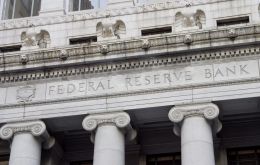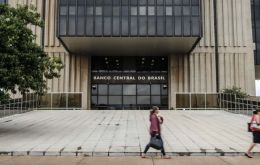MercoPress. South Atlantic News Agency
Tag: interest rates
-
Thursday, June 20th 2019 - 09:00 UTC
Divided Fed says no rates changes until 2020; criticism from Trump expected

A divided Federal Reserve held the line on interest rates Wednesday and indicated formally that no cuts are coming in 2019. The decision came amid divisions over what is ahead and still leaves open the possibility that policy loosening could happen before the end of the year depending on how conditions unfold.
-
Wednesday, June 5th 2019 - 09:41 UTC
Federal Reserve prepared to cut rates if trade conflicts threaten US economy

Chairman Jerome Powell said on Tuesday that the Federal Reserve is prepared to respond if it decides the Trump administration's trade conflicts are threatening the U.S. economy. Investors read his remarks as a signal that the Fed will likely cut interest rates later this year.
-
Friday, May 3rd 2019 - 08:40 UTC
Fed leaves interest rates unchanged despite strong pressure from Trump for a cut

The US Federal Reserve has kept interest rates on hold despite pressure from President Donald Trump to announce a cut. The central bank said borrowing costs will remain at between 2.25%-2.5%.
-
Saturday, April 6th 2019 - 09:43 UTC
Trump again puts pressure on the Federal Reserve to lower interest rates

United States president Donald Trump said on Friday the US Federal Reserve should lower interest rates and take other unconventional measures to ease pressure on an economy that he said they slowed down. “I think they should drop rates,” Trump told reporters. “I think they really slowed us down. There's no inflation.”
-
Saturday, March 23rd 2019 - 09:09 UTC
UK and US markets tumble on fears of a global slowdown

Markets in the UK and US have tumbled with analysts attributing the drop to growing fears of a global slowdown. The FTSE 100 saw its worst day of trading this year, closing 2% lower. In the US, the three main indexes ended between 1.9% and 2.5% lower.
-
Friday, March 22nd 2019 - 09:40 UTC
Brazil's central bank with new chief leaves rates unchanged; policy is determined “with caution and serenity”

Brazil's interest rates remained unchanged on Wednesday after the central bank held its first monetary policy meeting under its new chief Roberto Campos Neto. The central bank's unanimous decision -- only the second since pro-business President Jair Bolsonaro took power in January on a promise to revive Latin America's biggest economy -- to keep rates at 6.5% was in line with market expectations.
-
Thursday, March 21st 2019 - 09:40 UTC
Fed confirms it does not expect to raise interest rates in 2019

The US Federal Reserve does not expect to raise interest rates for the rest of 2019 amid slower economic growth. After a two-day meeting, monetary policymakers voted unanimously to keep the US interest rate range between 2.25%-2.5%.
-
Thursday, February 7th 2019 - 10:29 UTC
Brazil central bank leaves interest rates at record low 6.5%

Brazil’s central bank left interest rates at a record low on Wednesday as expected, and signaled it is in no rush to change them even though inflationary pressures have cooled. The bank’s nine-member monetary policy committee, Copom, voted unanimously to keep the benchmark Selic rate at 6.5% for the seventh straight meeting.
-
Thursday, December 20th 2018 - 08:59 UTC
Fed raises interest rate but lowers 2019 forecast to two hikes in 2019

The United States Federal Reserve raised its key interest rate on Wednesday for a fourth time this year but lowered its forecast to two hikes in 2019 amid the recent stock market sell-off and uncertain growth prospects.
-
Thursday, December 13th 2018 - 08:49 UTC
US consumer prices in November unchanged, with sharp decline for gasoline

The United States consumer prices were unchanged in November, held back by a sharp decline in the price of gasoline, but underlying inflation pressures remained firm amid rising rents and healthcare costs. The strength in underlying inflation reported by the Labor Department on Wednesday supports views that the Federal Reserve will raise interest rates at its Dec. 18-19 policy meeting. The U.S. central bank has hiked rates three times this year.
